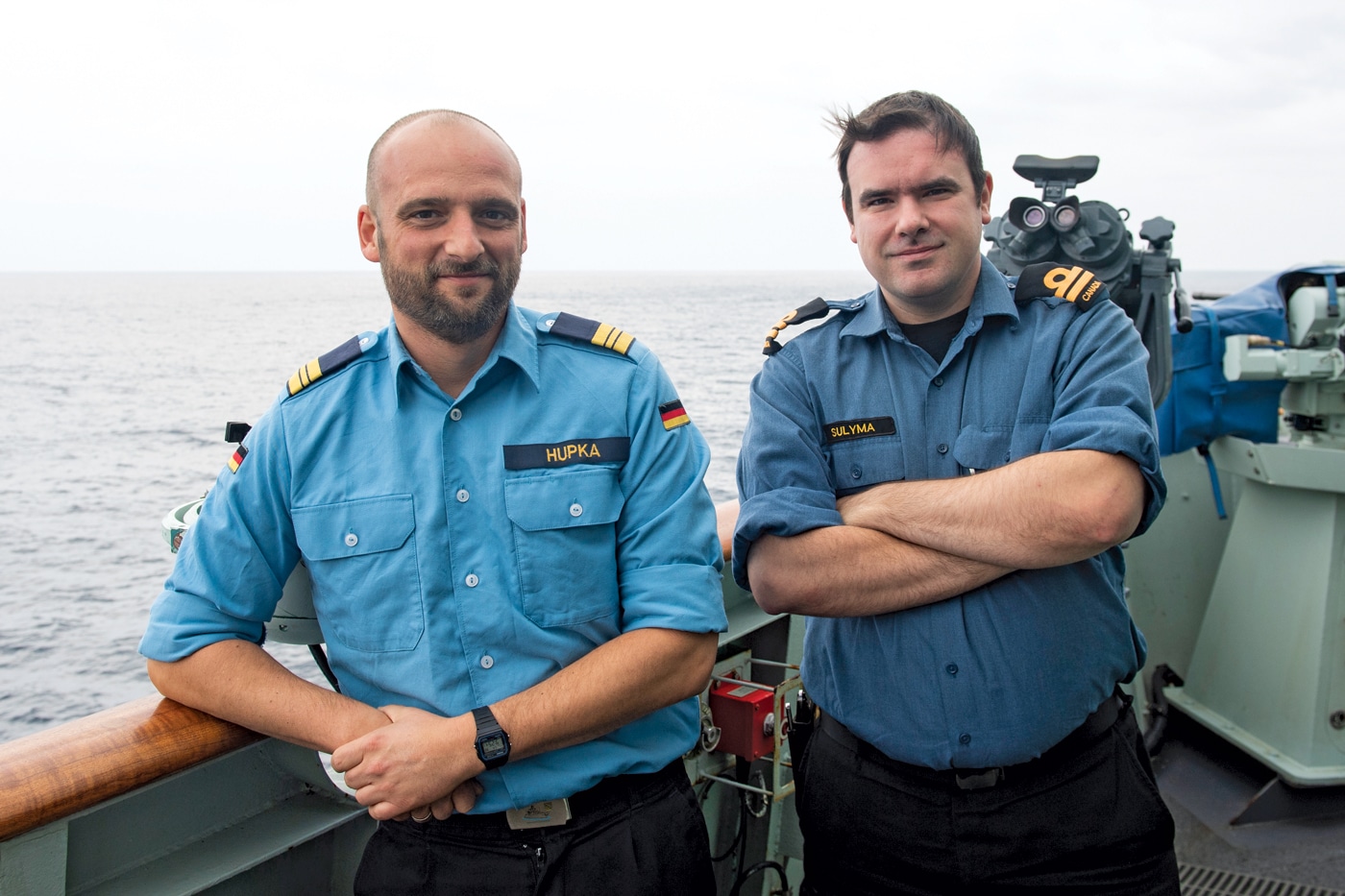HMCS Winnipeg welcomes German sailor to the team
By Lookout on Nov 16, 2021 with Comments 0

Kapitänleutnant Tim Hupka, a German Exchange Officer, and Lieutenant (Navy) Christopher Sulyma, on the bridge wing of HMCS Winnipeg. Photo by MCpl Andre Maillet, MARPAC Imaging Services
Lt(N) Christopher Sulyma
HMCS Winnipeg
––
In an environment that seems more fractious with every passing day, alliances and partnerships become increasingly valuable.
HMCS Winnipeg, currently deployed to South-East Asia on Operations Projection and Neon, has learned the importance of multi-national partnership first-hand.
Outside the guardrails, Winnipeg has operated with a multi-national carrier strike group, participated in multi-national exercises off Japan, sailed in consort with seven allied nations, and participated in enforcement of UN Security Council resolutions. On board, multinational partnerships are also flourishing, as Winnipeg hosted the first German exchange officer to participate in Operation Regulus, Canada’s officer exchange program.
Established in 2010, Regulus was created to enable sailors to gain valuable experience during a time when the Halifax-Class Modernization limited opportunities to sail at home. Since then, Canadian personnel have filled billets in numerous allied navies including the United States, France, United Kingdom, Australia, New Zealand, Ireland, and Chile, to name just a few. In turn, many allied naval personnel have sought placements and training within the Royal Canadian Navy to further develop their own skills and build the bridges of international cooperation that are vital to operations.
Kapitänleutnant Tim Hupka, from Wilhelmshaven, Germany, joined Winnipeg in Manila, Philippines, half-way through the deployment. The time alongside gave him an opportunity to settle into the ship’s Wardroom, and meet the men and women he would be living and working with for the next two months.
Assigned as his host, and a veteran of the Regulus program (Chile, April to September 2014), I was able to give KptLt Hupka a unique introduction to life aboard a Canadian warship. Within hours of his arrival, the ship’s Stoker’s Open commenced. or the uninitiated, this consists of a golf course built throughout the ship. Holes, clubs, and balls are all built using materials on-hand within the ship.
The usual mutual grilling commenced over drinks, where we learned that, in most ways that counted, our navies are extremely similar in tradition, attitude, and training. Much of this may stem from common ground: much of our training is modeled off of the Royal Navy (RN), and the German Navy uses FOST, the RN equivalent of Sea Training, to work their ships up.
KptLt Hupka will remain with Winnipeg for the remainder of the deployment, returning to Esquimalt with the ship before returning home to Wilhelmshaven for the holidays. He has expressed his excitement at getting to spend a couple days exploring Victoria before flying out, which will be his first time in Canada.
While with the ship, he will to participate in multi-national exercises, as well as the full spectrum of Op Neon operations. Outside of operations, he will join the ship’s ongoing ball-hockey tournament, and participate in a number of the morale-building events held on board.
The lessons that KptLt Hupka is learning while working with Winnipeg will pay dividends for the German Navy, who are beginning operations in the Asian Pacific. It has provided first-hand experience with how operations are conducted in the region, patterns of life, and many of the capabilities of the navies of the region (in particular, China).
Likewise, it has offered insight for the crew in Winnipeg to how the German Navy operates, and both broken and affirmed cultural stereotypes on both sides. KptLt Hupka was adamant, for example, that Germans do not revere David Hasselhoff nearly as much as popular culture would have us believe. Conversely, the Canadian love of hockey has been extremely reinforced, as have the rivalries that exist as consequence. A love of beer and Euchre, however, has proven to be quite mutual.
––––
Filed Under: Top Stories
About the Author:





